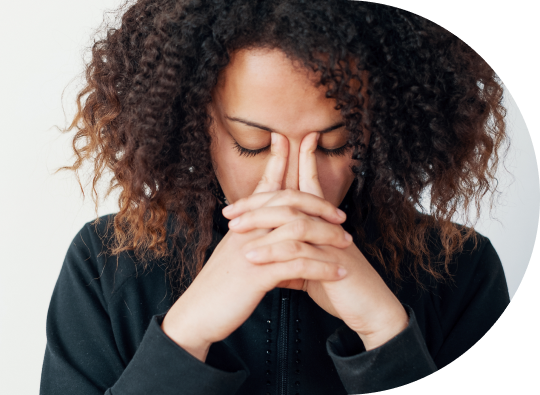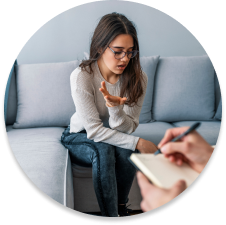
Anxiety Counseling for Hawaii
At Living Pono, we offer traditional counseling and a variety of others that can help you move forward with your life. Our counseling services are flexible and customizable, always putting the patient’s needs first. Our variety of therapeutic techniques allow us to help your brain process and heal from traumatic events that could be a source of anxiety.
How Does Counseling Help with Anxiety?
With anxiety on the rise, many people who experience minor or even debilitating anxiety might wonder if therapy can help. Many different kinds of counseling have proved to help with anxiety. Counseling can be an incredible and natural way to get anxiety symptoms under control, but it will take your commitment.
The various therapeutic approaches help with anxiety in specific ways. While EMDR might be the key to resolving your angst, cognitive behavioral therapy (CBT) or exposure therapy could be better for someone else. It largely depends on the individual and what method will work best with their situation. It is critical to have the proper counselor who will know how to assist using the appropriate approach(s).
With specific therapeutic approaches like EMDR, counseling can help with your anxiety. Every method is a different tool in the therapeutic toolbox. Cognitive behavioral therapy (CBT) is one of the most prevalent approaches for treating anxiety. CBT has shown undeniable results. To put it simply, it just works. The basic idea of CBT is to identify and address how you create anxious experiences through your patterns of thought, emotion, and behavior.
By recognizing the thoughts that may negatively influence your behavior, CBT changes those negative thought patterns to result in more positive behavior and, therefore, a less anxious experience overall. CBT has demonstrated positive results in treating many specific forms of anxiety like phobia, panic, social anxiety, and general anxiety.
Other Counseling Services
Sometimes anxiety isn’t the only roadblock, or maybe anxiety doesn’t even have anything to do with what you are experiencing. There is still help. At Living Pono, we offer various forms of counseling to assist people with depression, trauma, and more – not only anxiety.
We are also specifically trained in cognitive behavioral therapy, solutions-focused therapy, trauma recovery, and psychoeducation. Our goal at Living Pono is to be adaptable and fit the patient’s needs. We can customize and combine therapeutic methods to help you find the comfort and support you deserve. We can serve people of any age and have specific qualifications to work with children, teens, and adults.
Different Forms of Anxiety:
Social Anxiety
is significant distress and discomfort towards being a large group of people. Many individuals with social anxiety are concerned with being embarrassed, humiliated, rejected or looked down upon in social situations. Many people with social anxiety try to avoid social situations or endure the situation with great anxiety and discomfort and may even become physically ill in these types of settings. Social anxiety can include a fear of eating or drinking in public.

Phobia

Panic Disorder
is shown through recurrent panic attacks. These attacks occur with little to no notice and can interfere with an individual’s daily life. These symptoms can often feel like a medical emergency such as a heart attack or other life threatening illness and cause many people to seek immediate medical attention.
Symptoms of a Panic Attack
|
|
FAQ
Anxiety
What is anxiety?
Anxiety is an intense, excessive fear or worry about everyday situations. Some symptoms can include fast heart rate, sweating, feeling tired, irritability and difficulty breathing. Most individuals have experienced some form of anxiety in their daily life, such as the butterflies you feel when you have to give a public speech. But everyday anxiety is much more than that. Individuals with Generalized Anxiety find it difficult to live their life to the fullest because of being in a constant state of worry or fear.
What causes anxiety?
Anxiety can be brought on by childhood experiences such as trauma or stress. Sometimes anxiety is brought on by a recent event such as a natural disaster, difficult experience or chemical imbalance. Symptoms can arise as early as childhood or can show up at seemingly random times.
Are there different forms of anxiety?
Yes. There are various forms of anxiety. Generalized anxiety disorder is an everyday or persistent worry that interferes with your daily life. Symptoms can include restlessness, feeling on edge, easily tired, difficulty with concentrating, muscle tension or problems with sleeping.
Panic Disorders
is shown through recurrent panic attacks. These attacks occur with little to no notice and can interfere with an individual’s daily life. Symptoms of a panic attack include:
- Pounding heart
- Sweating
- Shaking
- Feelings of shortness of breath
- Chest pain
- Dizziness
- Feelings of choking
- Numbness or tingling in your hands, feet or through out the body
- Chills or hot flashes
- Nausea or abdominal pain
- Fear of losing control
- Feeling detached from reality
- Fear of dying
These symptoms can often feel like a medical emergency such as a heart attack or other life threatening illness and cause many people to seek immediate medical attention.
Social Anxiety
significant distress and discomfort towards being a large group of people. Many individuals with social anxiety are concerned with being embarrassed, humiliated, rejected or looked down upon in social situations. Many people with social anxiety try to avoid social situations or endure the situation with great anxiety and discomfort and may even become physically ill in these types of settings. Social anxiety can include a fear of eating or drinking in public.
Phobia
a specific, excessive and persistent fear related to an object, activity or situation that is generally not harmful. Most individuals cannot overcome this fear, even if they are aware it is irrational. Oftentimes they will go to extreme lengths to avoid what they fear. Some phobias include a fear of flying, public speaking and spiders
